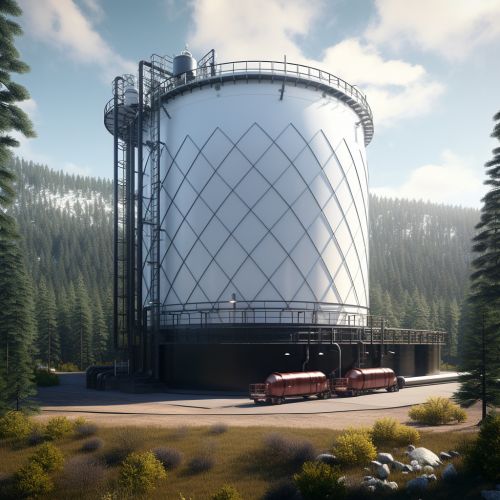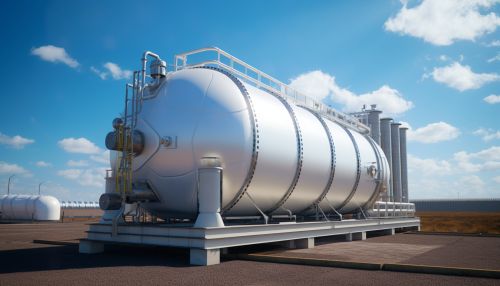Hydrogen storage
Introduction
Hydrogen storage is the practice of storing hydrogen in a state from which it can be later used as energy. It is a key component of hydrogen energy systems, which are increasingly being explored as a sustainable energy solution. Hydrogen storage methods can be broadly divided into physical storage, where hydrogen molecules are stored (including pure hydrogen storage), and chemical storage, where hydrogen atoms are stored as part of other molecules.
Physical Storage
Physical storage is the most straightforward method of storing hydrogen. This involves storing hydrogen molecules in a physical state, either as a gas or a liquid.
Gaseous Storage
Gaseous storage is the simplest and most commonly used method of storing hydrogen. This involves storing hydrogen gas under pressure in specially designed tanks. These tanks are typically made of steel or composite materials and are designed to withstand the high pressures required to store hydrogen gas.


Liquid Storage
Liquid storage involves cooling hydrogen gas to extremely low temperatures, causing it to liquefy. The liquid hydrogen is then stored in insulated tanks. This method of storage is more energy-intensive than gaseous storage, as it requires significant energy to cool the hydrogen to the necessary temperature.
Chemical Storage
Chemical storage involves storing hydrogen atoms as part of other molecules. This can be achieved through a variety of methods, including metal hydrides, chemical hydrides, and complex hydrides.
Metal Hydrides
Metal hydrides are compounds in which hydrogen is bonded with a metal or an alloy. These compounds can store a large amount of hydrogen in a small volume. When heat is applied, the hydrogen is released from the metal hydride.
Chemical Hydrides
Chemical hydrides are compounds in which hydrogen is bonded with non-metals. These compounds can store a large amount of hydrogen, but they typically require high temperatures to release the hydrogen.
Complex Hydrides
Complex hydrides are a type of chemical hydride that includes additional elements. These compounds can store a large amount of hydrogen and can release it at lower temperatures than other chemical hydrides.
Challenges and Future Research
While hydrogen storage presents a promising solution for sustainable energy storage, there are several challenges that need to be addressed. These include improving the efficiency of hydrogen storage methods, reducing the cost of storage, and ensuring the safety of storage systems. Future research in this field is focused on addressing these challenges and developing new methods of hydrogen storage.
